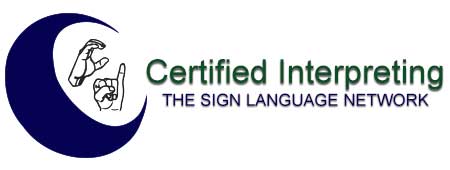Certified Interpreting is administered by, staffed by, and only hires professional interpreters who adhere to both legal and ethical standards. We fully support and highly value such standards, which coupled with our years of experience, results in the best practices of our profession. These standards include the following:
STATUTES:
Maine has developed regulations and laws which govern our profession (see: Maine Revised Statutes). These statutes provide a legal framework which provide guidance to interpreters, and assurance to consumers when hiring a professional interpreter.
LICENSURE:
All professional interpreters in Maine must be licensed by the Department of Professional and Financial Regulation. Interpreters must meet defined requirements so as to be licensed and legally interpret in Maine for remuneration.
CERTIFICATION:
The Registry of Interpreters for the Deaf is a non-profit national association of professional interpreters which has been providing certification attesting to the actual skill levels of interpreters. See: Overview of certification credentials.
PROFESSIONAL CONDUCT:
Additionally, we support the interpreter’s Code of Professional Conduct (CPC), a collaboration between the RID and the National Association of the Deaf (NAD), see: RID Code of Professional Conduct, which include the following tenets:
- Interpreters adhere to standards of confidential communication.
- Interpreters possess the professional skills and knowledge required for the specific interpreting situation.
- Interpreters conduct themselves in a manner appropriate to the specific interpreting situation.
- Interpreters demonstrate respect for consumers.
- Interpreters demonstrate respect for colleagues, interns, and students of the profession.
- Interpreters maintain ethical business practices.
- Interpreters engage in professional development.
An ASL translation summary of the CPC can be seen here.


